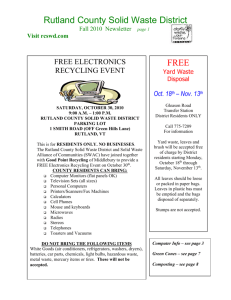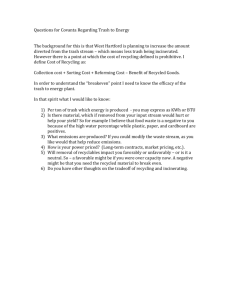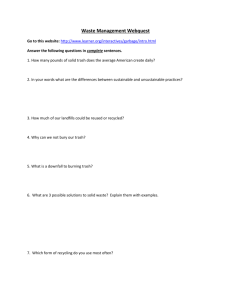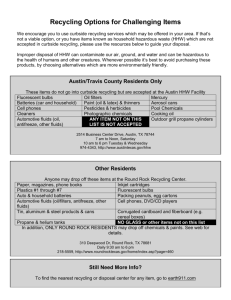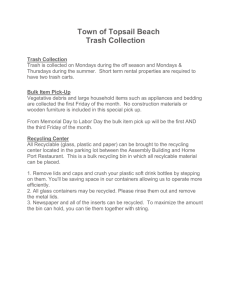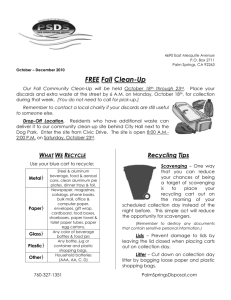carriers for sale - Rutland County Solid Waste District
advertisement
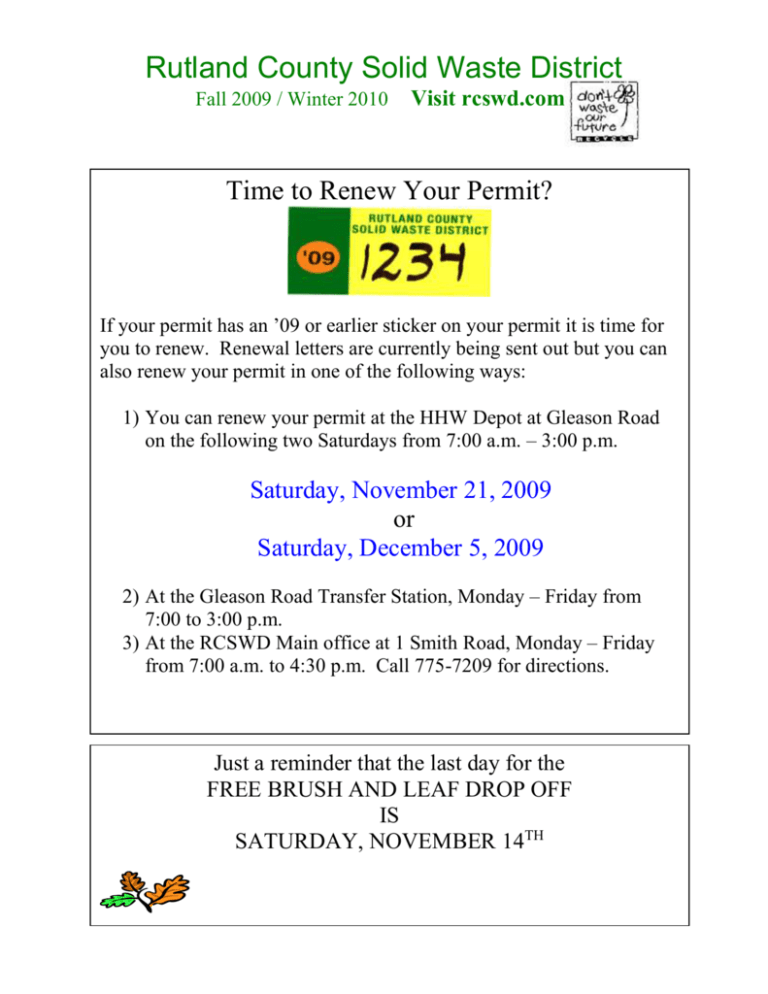
Rutland County Solid Waste District Fall 2009 / Winter 2010 Visit rcswd.com Time to Renew Your Permit? If your permit has an ’09 or earlier sticker on your permit it is time for you to renew. Renewal letters are currently being sent out but you can also renew your permit in one of the following ways: 1) You can renew your permit at the HHW Depot at Gleason Road on the following two Saturdays from 7:00 a.m. – 3:00 p.m. Saturday, November 21, 2009 or Saturday, December 5, 2009 2) At the Gleason Road Transfer Station, Monday – Friday from 7:00 to 3:00 p.m. 3) At the RCSWD Main office at 1 Smith Road, Monday – Friday from 7:00 a.m. to 4:30 p.m. Call 775-7209 for directions. Just a reminder that the last day for the FREE BRUSH AND LEAF DROP OFF IS SATURDAY, NOVEMBER 14TH Rutland County Solid Waste District Fall 2009 / Winter 2010 Visit rcswd.com Gleason Road Transfer Station Holiday Schedule THANKSGIVING DAY – Thursday, November 26, 2009 ---- CLOSED DAY AFTER THANKSGIVING – Friday, November 27, 2009 ---- OPEN Note: The Recycling Center will be open from 10:00- 3:00p.m. as well. CHRISTMAS EVE – CLOSING EARLY on Thursday, December 24th CHRISTMAS DAY –Friday, December 25, 2009 --- CLOSED DAY AFTER CHRISTMAS DAY – Saturday, December 26, 2009 - OPEN NEW YEAR’S DAY – Friday, January 1, 2010 --- CLOSED MLK, JR’S BIRTHDAY – Monday, January 18, 2010 --- OPEN PRESIDENT’S DAY – Monday, February, 15, 2010 --- OPEN Christmas Tree Recycling December 26, 2009 through January 2010 District residents can dispose of their Christmas Trees for free between Saturday, December 26, 2009 and through the month of January 2010 at Gleason Road. The District will accept trees cleaned of all tinsel and decorations at no charge. Planet – Aid – Collection of Shoes and Clean Clothing Rutland County Solid Waste District Fall 2009 / Winter 2010 Visit rcswd.com The District has teamed up with the organization of Planet-Aid for the collection of clothes and shoes. Residents can now drop off old clothes and shoes at the two yellow recycle bins at the Recycling Center. All items must be put in bags. All items must also be clean and in good condition. For more information contact the RCSWD at 775-7209. Free Hardcover Book Recycling Offer The RCSWD and GotBooks.com are sponsoring a free hardcover book recycling program. Any RCSWD resident, organization or business may bring to the Gleason Road Recycling Depot hardcover books for recycling at no charge. The books can be dropped off on Tuesdays, Thursdays and Saturdays when the Recycling Center is open. There is a box trailer on site where residents can put their books. For more information contact the RCSWD at 775-7209. NO ENCYLOPEDIAS, LAW BOOKS, MEDICAL JOURNALS PLEASE! What to do with Latex Paint? One of the recurring questions that we receive at the Rutland County Solid Waste District (RCSWD), is, “What do I do with old paint”? This depends upon what kind of paint Oil Base paint or stain is considered to be a hazardous material and is accepted at our HHW Depot at Gleason Road in Rutland. Latex paint, on the other hand, is not considered hazardous since it is mostly comprised of water. You can properly dispose of this by either opening the lid and letting the paint dry out or place kitty litter or sand in the pail and let the paint absorb with this material. Once this is dried up you can put the lid back on the can and throw out the can with your regular trash. This also helps us at the transfer station from having cans of paint explode and causing a mess when the loader is pushing trash from off the pad and into a trailer. For further information contact the RCSWD Hazardous Waste Depot at 7701333 or the main office at 775-7209 or check out the district’s website at www.rcswd.com. Did You Know? Rutland County Solid Waste District Fall 2009 / Winter 2010 Visit rcswd.com Recycling of one glass container saves enough energy to light a 100watt bulb for 4 hours (EPA). 1 ton of glass made from 50% recycled materials saves 250 lbs. of mining waste (EPA). BATTERIES With the holiday season coming up people are sure to buy, use and dispose of numerous batteries. Household batteries may contain heavy metals such as mercury, cadmium and lead. Improper disposal may provide a means for these heavy metals to be released into the air, groundwater, lakes, and streams via landfill runoff and incineration. Below is some brief information that might help you. You may also contact John Wasilewski at 770-1333 at our Household Hazardous Waste (HHW) Depot at Gleason Road. The HHW Depot is open Tues, Weds. and Thursdays from 7:00 – 3:00 p.m. Recycling and Disposal by Type Alkaline, Manganese, Carbon-zinc, and Zinc-air Used for: flashlights, calculators, toys, clocks, smoke alarms, remote controls, garage door openers, transistor radios. Sizes: AAA, AA, C, D, and some in 6V, 9V. Proper Disposal: Place in trash. Spent rechargeable alkaline batteries can also be disposed of with household trash. Please note: Alkaline batteries manufactured before 1996 may contain higher levels of mercury so bring them to our HHW Depot. Button Used for: watches, hearing aids, toys, remote controls. Sizes: vary, but resemble “buttons” in shape. Proper Disposal: These batteries contain mercury and silver. Bring to the HHW Depot for safe disposal. Lithium Used for: cameras, calculators, computer memory back-up, sneakers, greeting cards. Sizes: 3V, 6V, 3V button; usually has “lithium” label on the battery. Proper Disposal: Bring to the HHW Depot. Nickel Cadmium (Ni-Cd or Ni-Cad) Rechargeable and Lithium Ion Rechargeable Used for: flashlights, toys, cell phones, power tools, computer packs. Rutland County Solid Waste District Fall 2009 / Winter 2010 Visit rcswd.com Sizes: AAA, AA, C, D, 6V, 9V Proper Disposal: Both batteries contain metals and are hazardous wastes. Bring to the HHW Depot. Nickel Metal Hydride (NI-MH) Rechargeable Used for: cordless power tools, cellular and cordless phones, laptop computers, camcorders. Proper Disposal: Bring to the HHW Depot Rutland County Solid Waste District Fall 2009 / Winter 2010 Visit rcswd.com Gleason Road Transfer Station Etiquette We have many people who use the Gleason Road facility on a daily basis and especially on Saturdays. Staff would like to remind our customers of just a few rules of etiquette to help make your time at the transfer station go smoothly. If you are paying by check, please have as much of the information already entered on the check such as the date, the payee name which is ”RCSWD” and your signature. This would help to make things go faster as we give you the amount due to fill in the rest. Please do not block any of the intersections. If you are using the scales, please pay attention to the scalehouse attendant as he or she motions for cars to go on and off the scales. Many people will be talking on their cell phones and not notice what is going on. If you have a permit and only one or two bags of trash, you can pay by the bag at the recycling center when they are open for $2.00 a 30 lb. bag instead of the $7.00 minimum over the scales and recycling is free. Be patient – we have over 270 cars on average going over the scales on a typical Saturday and this does not include the traffic going up to use the recycling facility so we ask that you be patient please. Always remember: The Transfer Station is one place you are almost guaranteed to lose weight. Did you know? Recycling of each ton of paper saves 17 trees and 7,000 gallons of water (EPA). Recycled paper generates 95% less air pollution: each ton saves 60lbs of air pollution (Center for Ecological Technology). Plastic milk containers are now only half the weight that they were in 1960 (EPA). Recycled glass generates 20% less air pollution and 50% less water pollution (NASA). Recycling a pound of PET saves approximately 12,000 BTU’s (EPA). We use enough plastic wrap to wrap all of Texas every year (EPA). 4 lbs. of bauxite are saved for every pound of aluminum recycled (Reynolds Metal Co.). Rutland County Solid Waste District Fall 2009 / Winter 2010 Visit rcswd.com Proper Disposal of Syringes and Needles At-home treatment of diabetes, allergies, and other medical symptoms generates waste syringes, lancets, and other sharp items (called “sharps”). Discarding loose sharps with other household trash can hurt people. Anyone who handles the trash may be stuck accidentally. Used sharps can transmit germs. Diseases, such as Hepatitis B. can result from someone being accidentally stuck. A safe way to dispose of sharps is to use plastic bottles. The #1 PETE soda bottle is recommended because it is more puncture resistant than most other types of plastic bottles. Laundry detergent bottles work just as well. Label the bottle with the warning “DO NOT RECYCLE!” and carefully put each of your used sharps into the bottle. Keep the bottle out of reach of children. Seal the bottle with heavy tape (like duct tape) over the closed bottle cap when the bottle is full. Dispose of the filled bottle in your household trash. Mercury Thermometer Exchange Some common household items contain mercury including old thermometers. Mercury containing items should not be discarded as trash. Bring a mercury-containing fever thermometer to the HHW Depot and receive a new solar powered thermometer for free The HHW Depot is open Tues., Weds., and Thurs., from 7:00 a.m. to 3:00 p.m. If you have any questions, contact John Wasilewski, Household Hazardous Waste Specialist at 770-1333. Trash Burning Trash burning is illegal in Vermont. The Agency of Natural Resources (ANR) has a public education effort called, “Don’t Burn Vermont,” to inform Vermonters about the harmful effects of trash burning, the penalties for violating the law, and low cost and convenient alternatives to burning trash. You can find out more by visiting their website at www.dontburnvt.org or also check the RCSWD’s website as well. Rutland County Solid Waste District Fall 2009 / Winter 2010 Visit rcswd.com Rutland County Solid Waste District Fall 2009 / Winter 2010 Visit rcswd.com Reduce Waste and Its Impact on Global Warming with Green Cones Food scraps create methane as they decompose in the landfill and methane is a greenhouse gas with 23 times the heat-trapping capacity of carbon dioxide. For every ton of food scraps kept out of the trash, the equivalent of 6 tons of carbon dioxide are removed from the atmosphere thanks to reduced methane emissions. 1,000 homes taking this one simple action would equal taking about 400 cars off the road each year. Managing food scraps where they’re produced further reduces carbon emissions by eliminating the need to haul them to a composting facility or transfer station. The Green Cone food scrap digester allows residents to manage all food scrapes including meat, fish, dairy, and bones on site--- materials that are not commonly composted at home because of potential problems with pests and pathogens. How Green Cones Work Green Cones are in-ground digesters that are sited in yards, gardens, even right next to the house. The bottom part of the cone is buried in the ground, enabling the microorganisms and insects in the soil to break down the waste underground. The sun heats up the top part of the cone, helping to speed up the decomposition process. The food scraps are broken down into water, carbon dioxide, and a very small residue that remains in the bottom of the cone. Unlike compost bins, the cones do not produce compost. Rather, the nutrients are released into the soil during decomposition, nourishing plans near the cone. Once our Green Cone is in place, simply open the lid, add food scraps, and close the lid. That’s, it! Any sunny location and good or modified drainage are also critical to the process. Decomposition quickens during warm weather and slows during cool weather. The cones come with a detailed installation manual, instructions for use, a kitchen caddy for collecting food scraps, and accelerator powder to start the digesting process. The Green Cones are available at the Rutland County Solid Waste District Main Office 1 Smith Road, Rutland, VT The cost is $76.85 (this includes tax). For more info call 775-7209. Rutland County Solid Waste District Fall 2009 / Winter 2010 Visit rcswd.com Backyard Composting Compost is decomposed organic matter, made from leaves, grass clippings, wood chips and fruit and vegetable scraps. Added to your soil or sprinkled on your yard and garden, it helps grass and plants to thrive. Unlike some fertilizers, compost will not run off your yard and pollute local creeks and waterways. Since about 40% of the waste we each create is food and yard waste, composting can also help reduce the amount of materials you send to the landfill and help cut your trash bill down to size. Composting is easy. Simply put different yard trimmings such as leaves and grass clippings in bin or pile. You should have a mix of green material and brown material. Add water so the pile is slightly damp. Let the pile sit for 12 or 16 months. You can add fruit and vegetable scraps and other materials as generated. Cover new kitchen scraps with leaves or bury them in the pile. If the pile dries out, add more water to keep it damp. After 12 to 16 months, most of the material at the bottom of the pile will be dark, rich sweet-smelling compost. Sift or sort out large undecomposed materials and sprinkle the rest on your yard or garden. For faster results, turn the pile at least once a month. The pile should reach a temperature of 130 to 160 degrees and will ready in 6 to 9 months. The more frequently you turn the pile the faster your compost will be ready. For more information contract the RCSWD at 775-7209. COMPOSTERS AND KITCHEN SCRAP CARRIERS FOR SALE Kitchen Scrap Carrier Size: 8.5” x 9” x 11”H Capacity: 9.6 quarts Usage: Temporary storage of kitchen waste. Easily hangs on cupboard door or sits firmly on the counter. Only $10.00 13 Cubic Ft. Large enough for use By a family of 5 Only $45.00 Own your own Home Composter. Just throw scraps in the top, water and wait. Within a few months you can gather humus rich plant food. Call 775-7209 for information.
